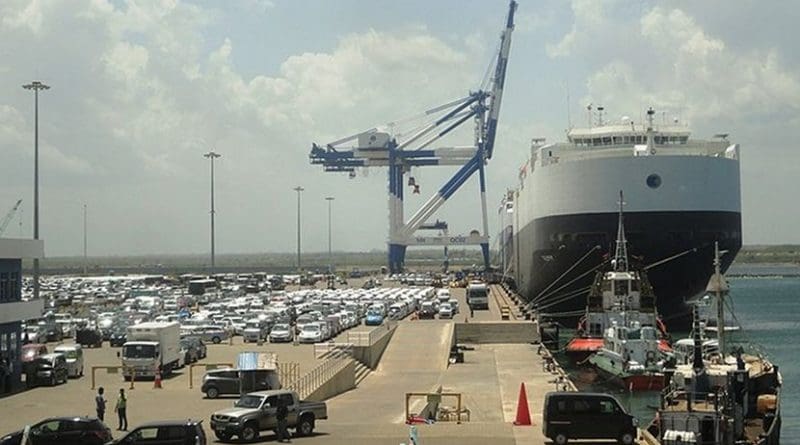Hambantota Is Being Unfairly Singled Out To Bash Sri Lanka, Says Lankan President – Analysis
But assures India that its security interests will never be compromised
In his address to the first batch of graduates of Sri Lanka’s National Defense College here on Wednesday, President Ranil Wickremesinghe made significant points: Firstly, Sri Lanka has unfortunately become a “punching bag” because of Hambantota port although that port is only one of the 17 Chinese ports in this region and is only a commercial port. Secondly, he assured New Delhi that Sri Lanka will not compromise on India’s security interests and will always work together with it to ensure the security of the region.
Fuss Over Hambantota
“The geopolitics of the Indian Ocean has unfortunately made us the punching bag for Hambantota. Actually, there are about 17 ports that are operated by the Chinese in the Indian Ocean. Different companies. There are some more ports that are operated by Dubai World ports. Now, all the ports are commercial ports. So is Hambantota. It is not a military port,” the President stressed.
“If there is security significance, it is in the port of Darwin in Australia where you have, as they say, Chinese ports are operating side by side in the area which the Australian and the US forces use for training. We don’t have that. We don’t allow anyone to come and train here, but we do have our southern command of the navy. We have a divisional headquarters of the army and we have a detachment of the Air Force. They only ensure that this is a commercial port.”
“So though we are a commercial port, it shows our strategic importance that many people come to conclusions which are unwarranted. And I hope the next agreement we come to with China, will not cause such speculation. It is only about debt reduction for Sri Lanka,” Wickremesinghe assured.
Plight of a Small Nation
“First and foremost, in this region, the biggest tension does not come from the sea. It comes from the Himalayas, where, two new nuclear powers, face each other. Secondly, it comes from the Horn of Africa and the Red Sea where bases are being established and militarization is going on. In fact, all those who are militarizing the Horn of Africa, point to us who have not militarized anything, and they say we are the ones who are doing it. So this is the irony of life and the irony of being a small nation.”
“Nevertheless, we do not want the tension in the Pacific to flow over here. It’s not only us. ASEAN doesn’t want it. They don’t want it to come beyond the South China Sea. So, we are with ASEAN on that. We certainly do not want the problems of the Pacific coming into the Indian Ocean.”
“So let us look at how we can maintain our stability. We do this because we want the Indian Ocean to be stable and to be open to all. That’s why we have asked for a code of conduct for the Indian Ocean and freedom of navigation to apply and also the freedom of undersea cables. That is important for commerce to carry on.”
“We have to remember that the bulk of the petroleum supply, energy supply to the world goes through the Indian Ocean. A large amount of shipping goes through the Indian Ocean. We don’t want this to be an area of conflict and area of war. And this is one of the reasons that worry me, because I am in total agreement with the Prime Minister of Singapore and the Deputy Prime Minister who refer to the fact that you can have an unwarranted war.”
“We don’t want that. We want peace and harmony. We don’t want to see big power rivalry in the ocean, because that big power rivalry gets reflected everywhere. We don’t say that the Indian Ocean should be locked out for others. In 1977, we said that the Indian Ocean Peace Zone did not prevent the American fleet from being present there. Subsequently, we have seen the Japanese maritime defense forces here. Certainly, we are not against it. We like to see them here. And then you have seen the People’s Liberation Army, navy here. Its not only here. Many other European navies are now coming here. So these are developments. If the navies want to come, we have no problem. They helped in the anti-piracy operations. But we don’t want a level of rivalry which will affect the security and the peace of our area.”
Will Not Take Sides
“We will not join any big power or take sides, we will stay out of it. And that’s why we want to ensure that the big powers and their rivalry doesn’t lead to conflict in the Indian Ocean. That’s one thing we can’t afford.”
“We are faced with so many problems, non-military problems. Look at the questions today. We are facing a shortage of food, of economic development, of global climate change. Those are more than sufficient for us to focus on. We don’t want our attention taken away by others.”
Security Commitment to India
“When it comes to the security of Sri Lanka, we are of the view that in looking after the security of Sri Lanka we must also ensure that nothing adverse happens to the security of India. That we have been committed to, and we will go ahead with it. There will be no movement out of it. And certainly, our security. That’s why we work with India on the Colombo conclave, on the trilateral security arrangements and many other fields, especially outside the military field of piracy, of human trafficking, of drugs. All those are useful ways in which we cooperate with India and the other island states.”

